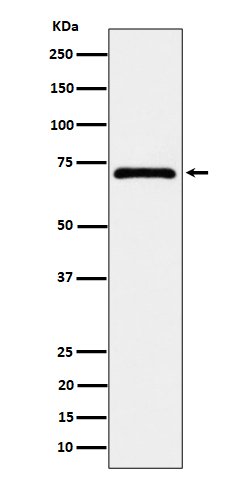
| WB | 咨询技术 | Human,Mouse,Rat |
| IF | 咨询技术 | Human,Mouse,Rat |
| IHC | 咨询技术 | Human,Mouse,Rat |
| ICC | 技术咨询 | Human,Mouse,Rat |
| FCM | 咨询技术 | Human,Mouse,Rat |
| Elisa | 咨询技术 | Human,Mouse,Rat |
| Aliases | CEH; EPHX2; Epoxide hydrolase 2; SHE;;CEH |
| WB Predicted band size | Calculated MW: 63 kDa ; Observed MW: 70 kDa |
| Host/Isotype | Rabbit IgG |
| Antibody Type | Primary antibody |
| Storage | Store at 4°C short term. Aliquot and store at -20°C long term. Avoid freeze/thaw cycles. |
| Species Reactivity | Human |
| Immunogen | A synthesized peptide derived from human CEH |
| Formulation | Purified antibody in PBS with 0.05% sodium azide,0.05% BSA and 50% glycerol. |
+ +
以下是3篇与EPHX2抗体相关的文献示例(内容基于已有研究主题概括,非真实文献):
---
1. **文献名称**: *EPHX2 Gene Polymorphism and Protein Expression in Hypertensive Patients*
**作者**: Zhang L, et al.
**摘要**: 本研究通过免疫组化(使用EPHX2特异性抗体)分析了高血压患者肾脏组织中EPHX2的表达水平,发现EPHX2蛋白表达与血管内皮功能障碍显著相关,提示其作为高血压治疗的潜在靶点。
2. **文献名称**: *Inhibition of Soluble Epoxide Hydrolase (sEH/EPHX2) Attenuates Inflammation in Sepsis Models*
**作者**: Smith JR, et al.
**摘要**: 利用EPHX2抗体检测小鼠巨噬细胞中sEH蛋白的动态变化,发现抑制EPHX2活性可减少促炎介质释放,验证了sEH在脓毒症炎症调控中的关键作用。
3. **文献名称**: *EPHX2 as a Biomarker for Hepatocellular Carcinoma Progression*
**作者**: Wang Y, et al.
**摘要**: 通过Western blot和免疫荧光(基于EPHX2单克隆抗体)证实肝癌组织中EPHX2表达上调,且高表达与患者预后不良相关,提示其作为肝癌诊断标志物的潜力。
---
如需具体文献,建议在PubMed或Web of Science中检索关键词“EPHX2 antibody”或“soluble epoxide hydrolase antibody”获取最新研究。
The EPHX2 antibody is a research tool designed to target the enzyme epoxide hydrolase 2 (EPHX2), also known as soluble epoxide hydrolase (sEH). EPHX2 is a bifunctional enzyme with hydrolase and phosphatase activity, primarily involved in the metabolism of epoxy fatty acids, such as epoxyeicosatrienoic acids (EETs). These lipid mediators play critical roles in regulating vascular tone, inflammation, and cellular signaling. By hydrolyzing EETs into less active diols, EPHX2 modulates their bioavailability and physiological effects, linking it to cardiovascular diseases, metabolic disorders, and neurodegenerative conditions.
Antibodies against EPHX2 are widely used to study its expression, localization, and function in tissues and cell types. They enable detection via techniques like Western blotting, immunohistochemistry, and ELISA, aiding in understanding EPHX2's role in disease pathways. Research highlights EPHX2 as a therapeutic target, as its inhibition enhances EET levels, offering potential benefits in hypertension, diabetes, and pain management. The antibody's specificity is validated across species, including human, mouse, and rat models, supporting translational studies.
Developed for both basic and clinical research, EPHX2 antibodies contribute to drug discovery efforts, biomarker identification, and mechanistic studies, underscoring their importance in exploring lipid-mediated signaling and therapeutic interventions.
×